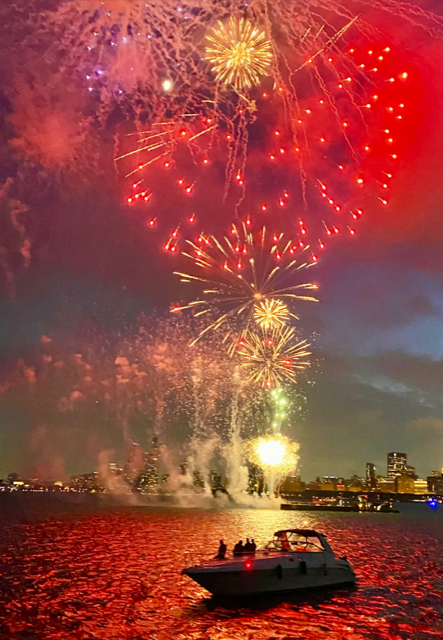Top 5 Reasons For Boating Accidents on July 4

ANNAPOLIS, Md. – Lakes, launch ramps and harbors will again be crowded on the boating season’s traditional peak holiday period surrounding the July Fourth holiday. As the number of boats, personal watercraft and paddlecraft goes up, boaters should no look further than recently released annual U.S. Coast Guard statistics for some lessons on how to keep everyone aboard safe during this busy time of the year, especially for on-water fireworks shows.
According to data from the recently released 2022 Recreational Boating Statistics, the top five primary contributing factors in boating accidents last year were operator inattention, operator inexperience, improper lookout, excessive speed and machinery failure.
“Nearly all of these factors will come into play on the water around Independence Day, and especially on the evenings with fireworks shows when boaters congregate to view them,” said Chris Edmonston, BoatUS Foundation for Boating Safety and Clean Water president.
“After the show ends, as boating spectators pull anchor and head for home en masse, is really when a boat operator will experience the significant difference from operating during the daytime.” Edmonston explains that it is much more difficult to distinguish boat speed, direction or angle, and distance to other moving vessels at night. “Double check to ensure your navigation lights are working properly to ensure others see you,” he said.
Compounding the problem is the race to get home. “Many simply travel too fast for the conditions,” he said. “Everyone is leaving at the same time, and you’ll will really need to focus on safety. Use others on your boat as extra lookouts, and keep your eyes focused ahead while scanning around you.”
Additionally, a long day on the water means stressors such sun, wind and wave action degrade a boat operator’s ability, and adding alcohol to the mix only makes the situation worse. It’s much better to celebrate America’s birthday and imbibe when you are at the dock or safely ashore.
Because everyone wants to see the show, overloading is also a real issue this time of year. Small vessels are prone to swamping in the wake action that follows the close of a show. Weight and balance should be top of mind for small boat operators.
Paddlecraft will also add to the on-water congestion this time of year. Paddlers may not have the full set of safety skills and may not be easy to see, or they might be paddling on highly trafficked waters, so keep an eye out for them.
Finally, before you head out at night, know how to dim the brightness on your chartplotter or GPS, check your running lights, and ensure your visual distress signals are available if you find yourself in need of assistance.



